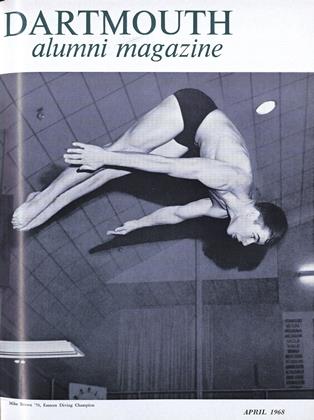RICHMOND LATTIMORE '26 is to Greek translation as Greenwich is to time or as the London Times says, "the standard by whom others must thenceforth be judged."
Dr. Lattimore, Paul Shorey Professor of Greek at Bryn Mawr, is acknowledged by critics and scholars as the master translator of his time and is best known for his renderings of the Iliad in 1952, the Odyssey in 1967, Pindar, Hesiod, the Greek Lyrics, and much of Euripides, as well as Aeschylus' Orestia.
"In translating," he says, "I want to get over the real meaning of the original and put it in the sort of diction I would use myself, without prejudicing it. Let the work speak for itself."
This Greek scholar's choice of career, if not his talent, is a natural inheritance. His father David Lattimore was Professor of Far Eastern Civilization at Dartmouth and tutored* his son in Greek. Though Richmond spent his first fourteen years in China, where he was born, Hanover is home to Him and is commemorated in Hanover Poems, his first volume of poetry, written with Dartmouth Professor of Belles Lettres Alexander Laing '25.
Professor Laing says of Lattimore: "His translations are the most skillful of his generation, bringing over from the Greek accurate equivalents of meaning in forms suggestive of the original that never fail to be good English poetry."
In his basic honesty, Professor Lattimore resists the temptation to take liberties in translating and show off his own poetic skill. He approaches Homer with a modesty and respect that let him succeed in a perfect compromise between being too literal and too free.
Writing his own poetry is as important to him as translating. In addition to Hanover Poems he has published Poems in 1957, Sestina for a Far-Off Summer in 1962, and Selected Poems in 1965. But he is employed as a teacher and his motto is: No teaching without scholarship; no scholarship without real scholarship.
A former Rhodes Scholar, he has the credentials to criticize scholarship. His achievements are marked by five earned degrees including an M.A. and Ph.D. from the University of Illinois and an A.B. and M.A. from Oxford. With a Fulbright he spent half of 1952 in Greece and returned there in 1960 and 1961. He was a Fulbright Lecturer at Oxford in 1963-64. He is also a Fellow of the American Academy in Rome.
Next year is a sabbatical. He has no definite commitments but is already at work on a translation of Iphigeniain Tauris.
"I would like to write as much poetry of my own as I can," he says. He is looking forward to bringing out a volume of collected poems in about three years.
"In the long view I think I might get to work on a translation of the New Testament. I want to avoid the oldfashioned stuff, but also avoid the chattiness of some current translations."
President Dickey presented Lattimore with an honorary Doctorate of Letters in 1958 and said: "A society with less and less knowledge of the Greek language must look increasingly to you as a trustee for the conveyance to it of its own past. That this trust will be honored as befits the subject is promised in these words of your own poetry:
Live only to understand only the thing in your hand, the sight that sticks in your eye, the wish that sticks in your heart and will not let you be until it is made art."
 View Full Issue
View Full Issue
More From This Issue
-
 Feature
FeatureFinancial Gaposis?
April 1968 -
 Feature
FeatureThe DOC: A Learning Experience
April 1968 By Jack Noon '68 -
 Feature
FeatureArt Collector and Author
April 1968 -
 Feature
FeatureBronx County Chairman
April 1968 -
 Feature
FeatureA NEW LOOK ON THE INN CORNER
April 1968 -
 Article
ArticleNick Jacobson '35, Playwright
April 1968 By ALEXANDER LAING '25
Features
-
 Cover Story
Cover StoryTops in Their Class
April 1981 -
 Cover Story
Cover StoryPRESIDENTIAL SEAT CUSHION
MARCH | APRIL 2014 -
 Feature
FeatureIn the Blink of an Eye
May/June 2011 By BRAD PARKS '96 -
 Feature
FeatureTelling Another's Tale
May 1981 By Gregory Rabassa -
 Feature
FeatureThe Dean
December 1987 By Lee Michaelides -
 Feature
FeatureCOMMENCEMENT 1972
JULY 1972 By ROBERT B. GRAHAM '40

